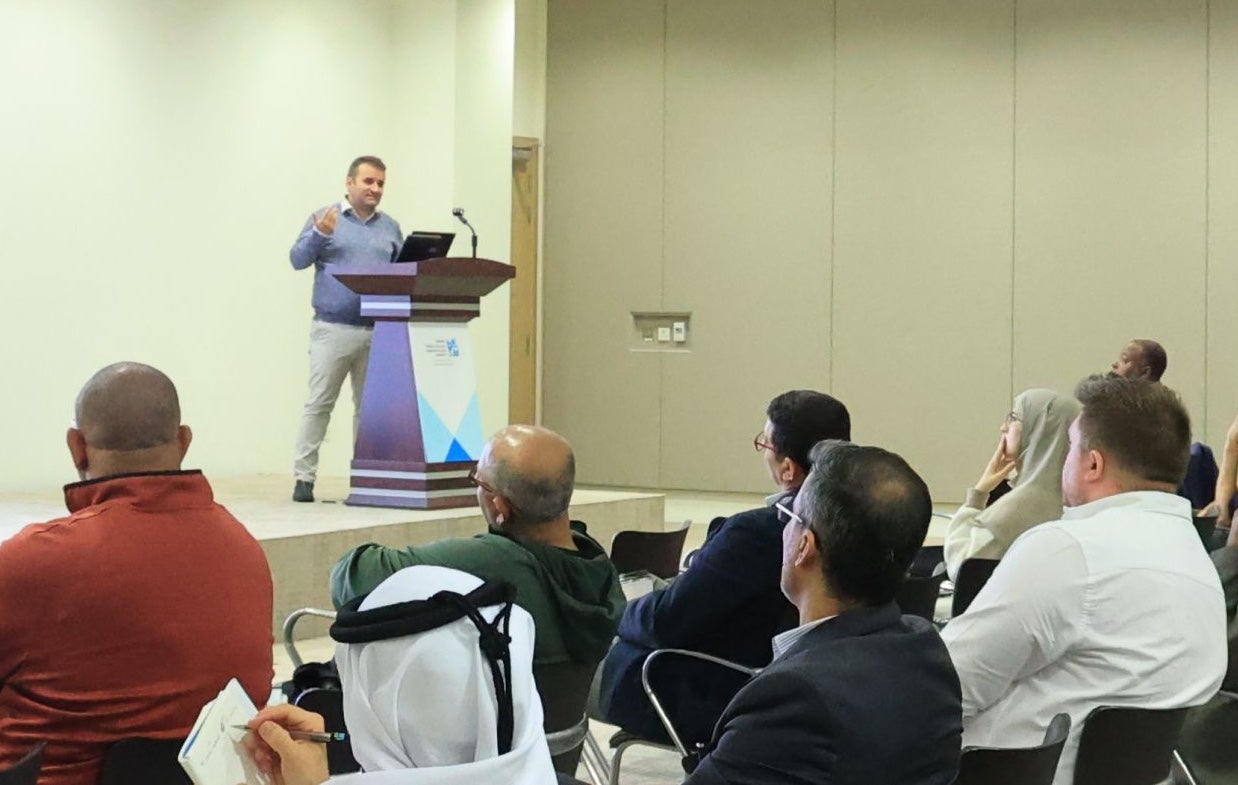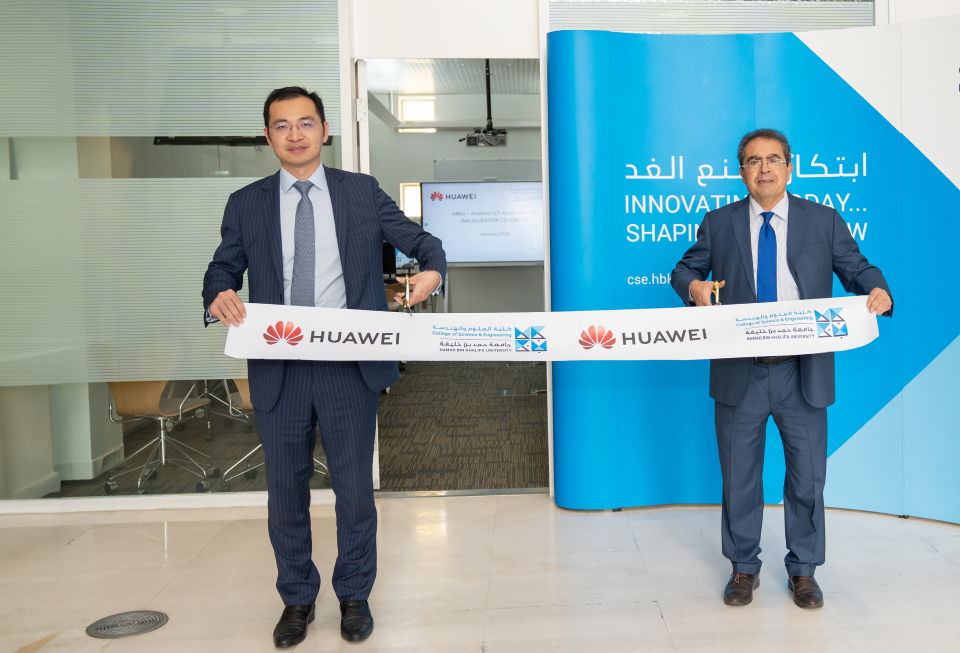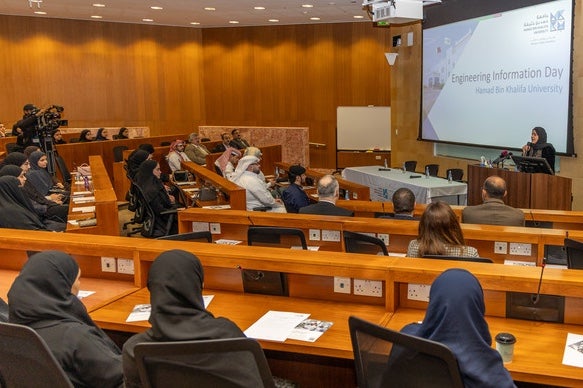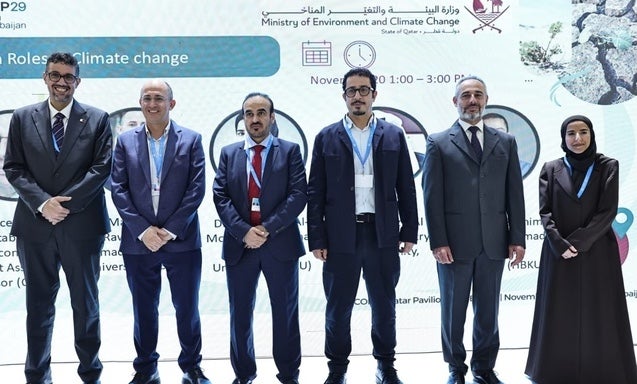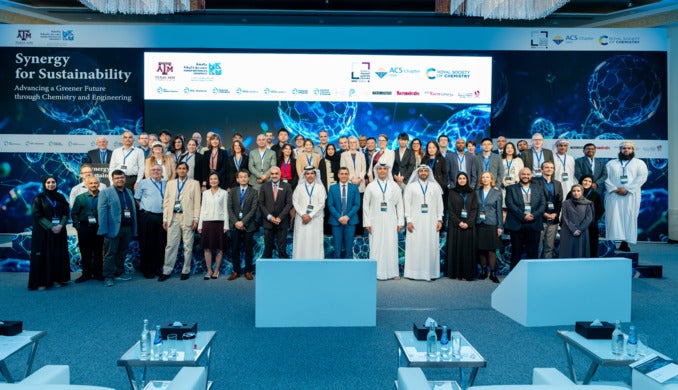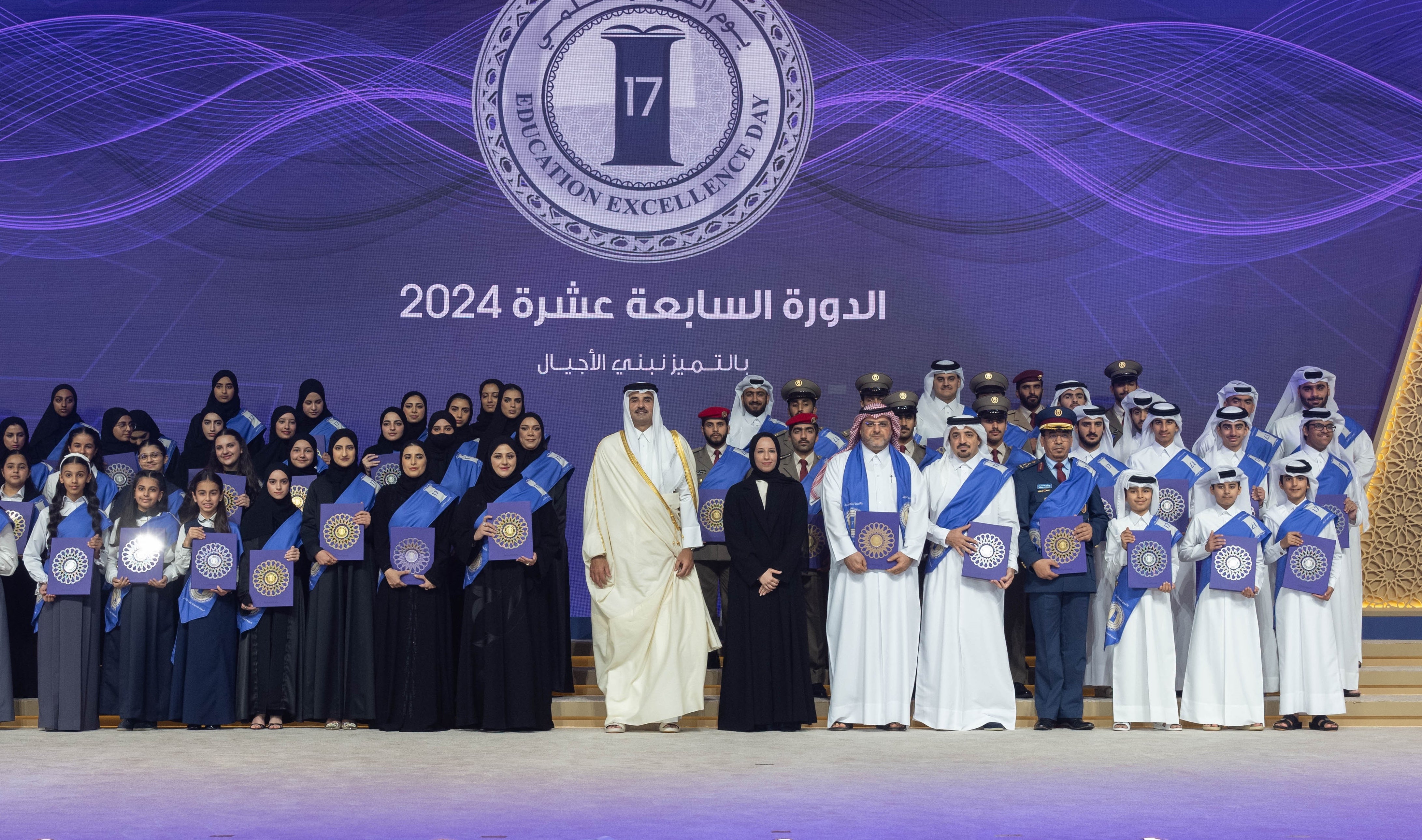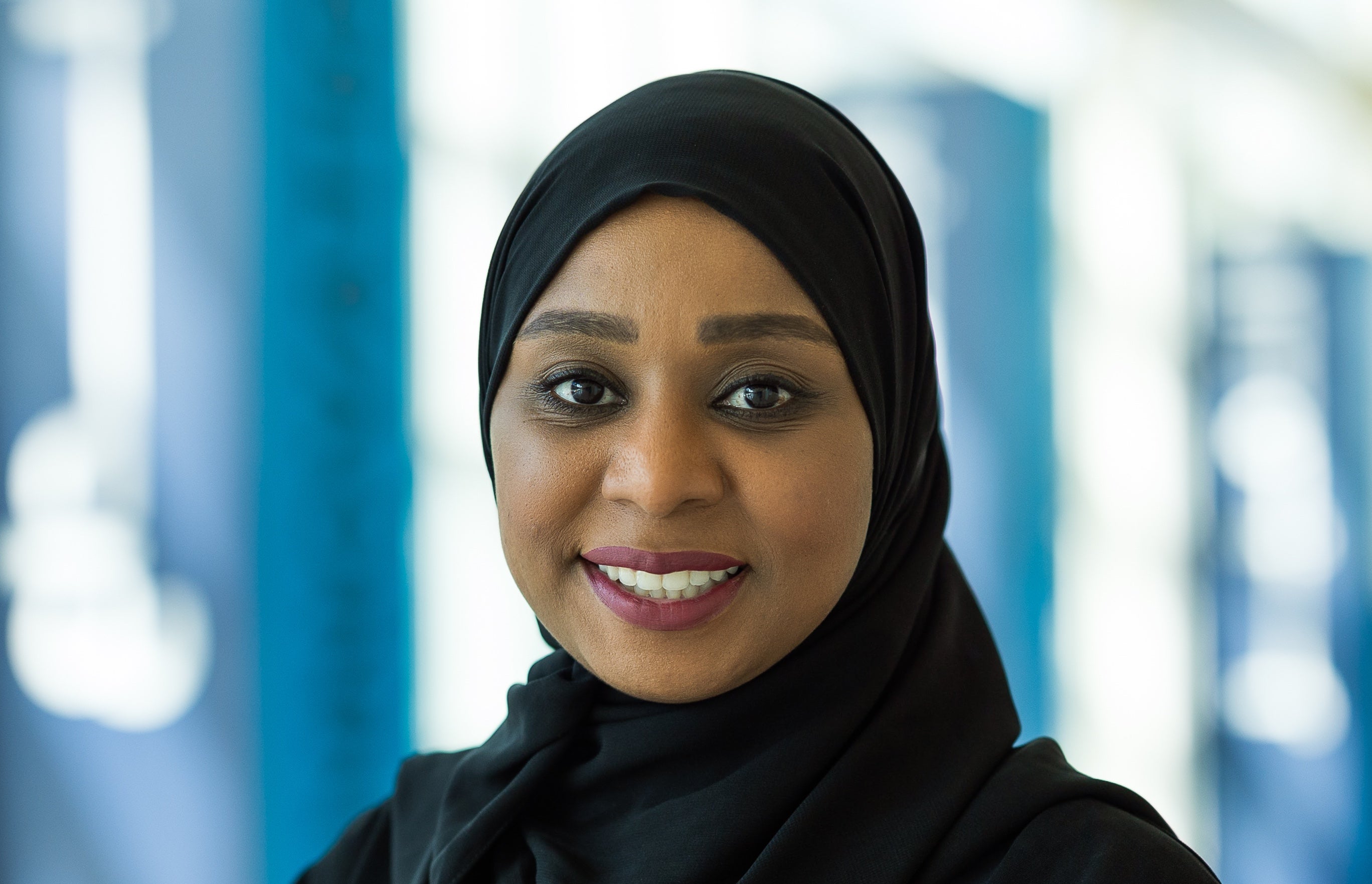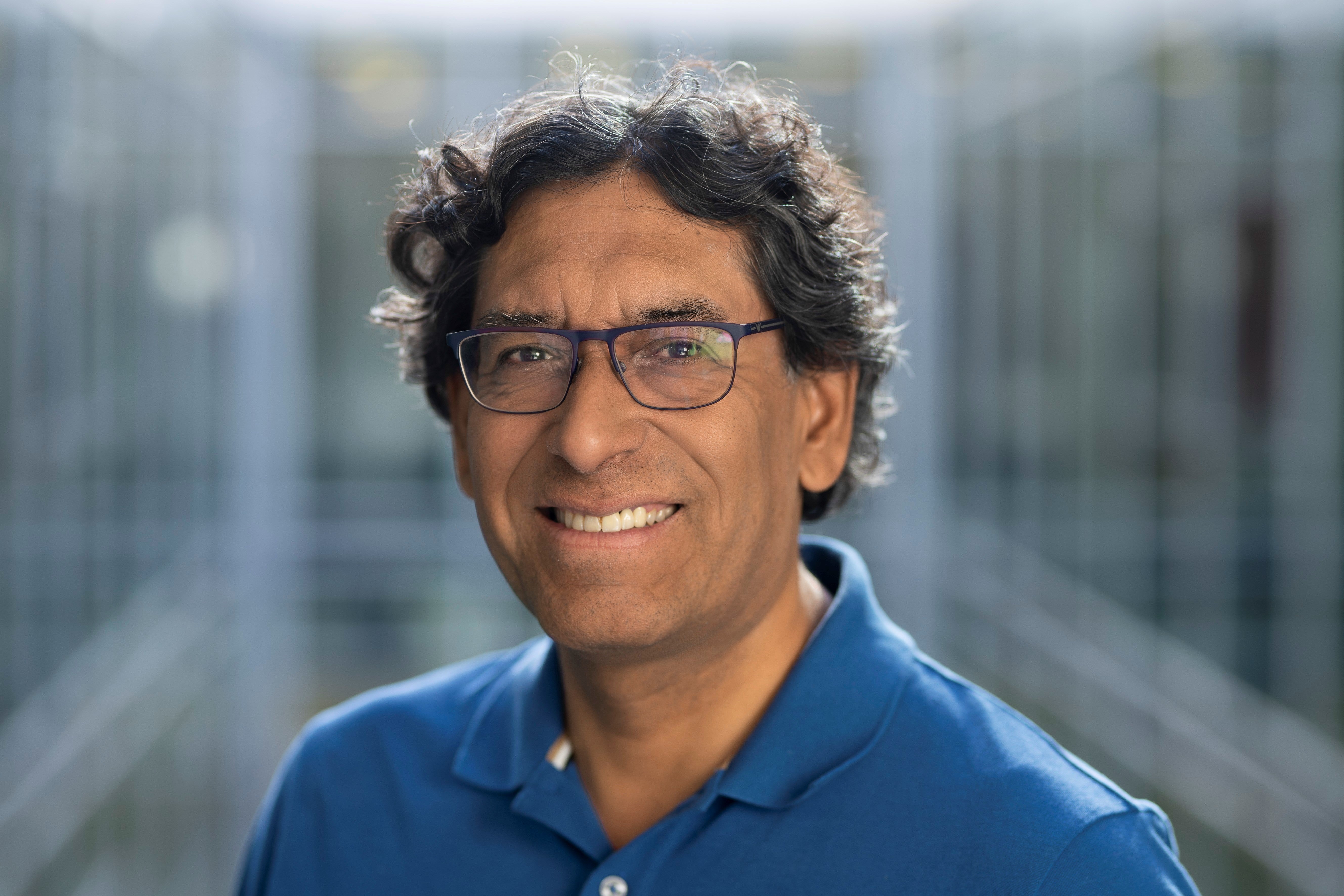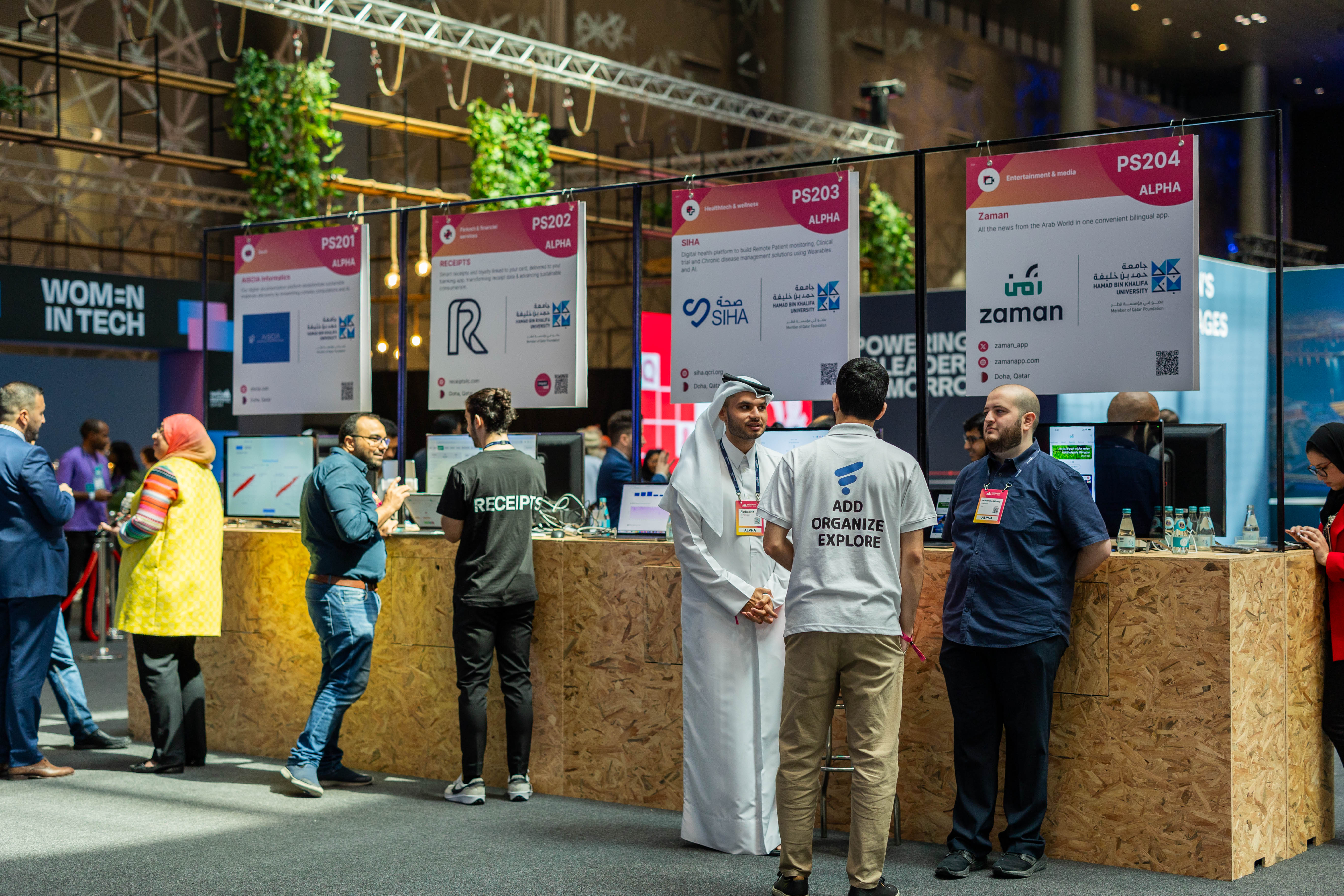
CSE Studies Urban Resilience in GCC Ahead of FIFA World Cup
College of Science and Engineering aims to create lasting sustainable development in the GCC region
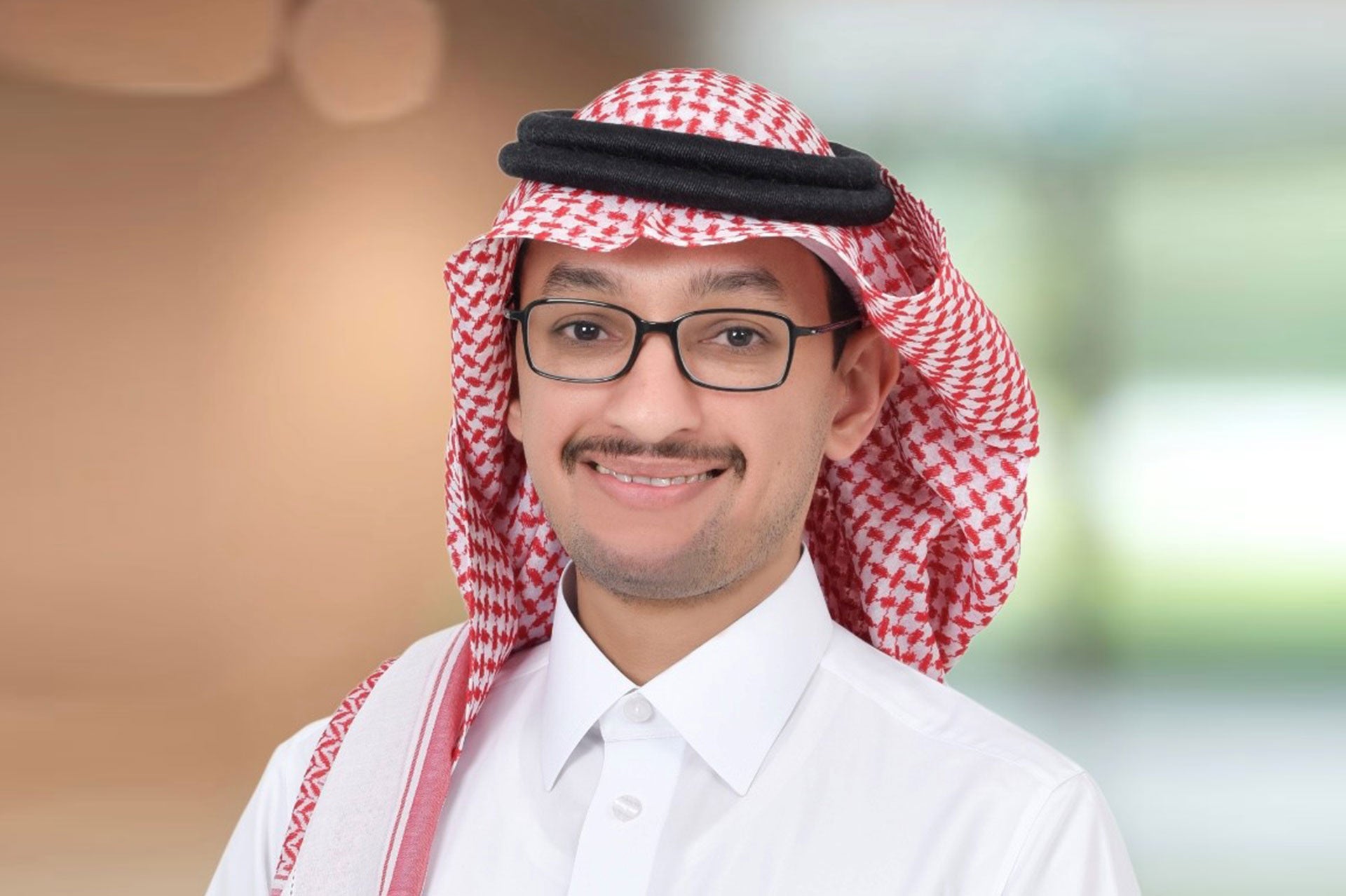
Hamad Bin Khalifa University (HBKU), through the College of Science and Engineering (CSE)’s Sustainable Built Environment (SBE) Research Group, is studying mega events in the region - including the FIFA World Cup Qatar 2022 - to investigate the resilience of urban infrastructure. The studies aim at decreasing the vulnerability of the Gulf Cooperation Council (GCC)’s built environment and protecting its social, economic, and environmental aspects. They were funded by Qatar National Research Fund and supported by Qatar Foundation.
Dr. Sami G. Al-Ghamdi, Associate Professor of Sustainable Built Environment and Climate Change Resilient Infrastructure, who leads the SBE Group, is working with post-doctoral fellow, Dr. Furqan Tahir, and PhD candidates, Mohammad Zaher Serdar and Mohammed Mousa Al-Humaiqani, on various streams of urban resilience assessment research.
Serdar's research is focused on quantifying resilience, identifying the optimal recovery plan for critical disturbances, as well as the interdependencies of critical infrastructures during mega events. His study tackles urban infrastructure resilience during the FIFA World Cup 2022, Dubai Expo 2020 in the United Arab Emirates, and Hajj, the annual Islamic pilgrimage to Mecca, Kingdom of Saudi Arabia. While mega events present a unique and vital opportunity to boost a host country’s economy as well as its development, they present a formidable challenge to its resilience.
In his study of the FIFA World Cup 2022, Serdar considers the critical role of Qatar’s transportation network in shaping the experience of visitors and in the event’s success. Using a multilevel resilience assessment framework he developed, Serdar evaluated the resilience of Qatar’s road network during the mega event under several extreme scenarios. Although the road network showed reliable performance, both under intentional attacks and random accident scenarios, there were some concerns regarding extreme flooding scenarios, denoted as a critical disturbance. The metro network, with a supporting role in the mobility of fans, did not suffer any degradation. However, precautions should be taken in future event planning to avoid threats under climate change scenarios.
He explains: "Critical infrastructures share the same space and mutual dependencies, and consequently, contribute to a city's overall resilience. However, each has different assessment methods and metrics, which prevents the direct integration of performance results for different infrastructures. To address this challenge, our multi-criteria-based integration framework allows for combining evaluation results from different assessment methods through partial factors."
In other studies, the researchers focus on the qualities of the built environment and the resilience of systems linked to climate change. With high urbanization rates, GCC cities face several emerging challenges: climate change impacts, intentional attacks, random failures, and a conventional approach to planning that limits efficiency. To illustrate, flash and unusually heavy flooding have caused extensive damage to private and public assets and infrastructures in several GCC countries over the past two decades.
Al-Humaiqani's research includes developing a roadmap that facilitates the adaptation of resilience qualities into different systems of the built environment. It focuses primarily on incorporating resilience into planning by improving the policy system, strengthening resilience assessment, and improving the adaptive, absorptive, coping, restorative capacities of urban systems. He aims to incorporate these qualities as an inherent practice and use a design thinking approach in policy-making, academia, and the public and private arenas. The research includes the development of a systematic framework to capture the interactions and interconnections of the different resilience qualities and indicators. The framework will be a good start to developing progressive policies and strategies that will formulate the pillars of a resilient city, considering the physical, social, technological, and economic infrastructure status.
He comments: "The change and uncertainty inherited from the past or generated over time due to climate change incrementalism emphasize the necessity of providing necessary support for disaster preparedness, emergency management, community resources utilization, and mitigating losses. The climate change consequences on the built environment need to be efficiently avoided or minimized through deploying integrated resilience indicators and qualities into planning and design methodologies and incorporating their requirements into the relevant policies. Such actions would direct the construction industry to build resilient environment systems with adequate capacities to respond promptly and prevent failure or breakdown due to external disruptions. This is where our research focuses.”
In the broader scope, resilience is an integral part of sustainable development. According to Dr. Al-Ghamdi: "All human activities release some emissions which stimulate anthropogenic climate change, leading to an increase in the rate and intensity of natural disasters that impact the built environment. However, resilience aims to reduce the vulnerability and exposure of the built environment, protecting the social, economic, and environmental aspects and pillars of sustainable development."
Upon completing their projects later this year, the researchers’ findings will provide meaningful recommendations and a reference for policymakers, regulating authorities, and infrastructure management entities to develop and plan for a more resilient built environment in the GCC.
Dr. Mounir Hamdi, CSE Founding Dean, says: "At CSE, the sustainability and resilience of the built environment, especially to climate change, are at the core of our research interests. Such investigations contribute to the realization of Qatar’s National Vision 2030 and provide locally developed solutions across the region."
Research efforts like these can be vital to the success of mega events in the region while helping cities prepare in a sustainable way for climate change impacts. With cities continuously evolving, resilience is key to achieving the United Nations Sustainable Development Goals in the age of climate change. These research projects help the region develop the local capacities to realize these goals.
For information on the College of Science and Engineering, please visit cse.hbku.edu.qa
Related News
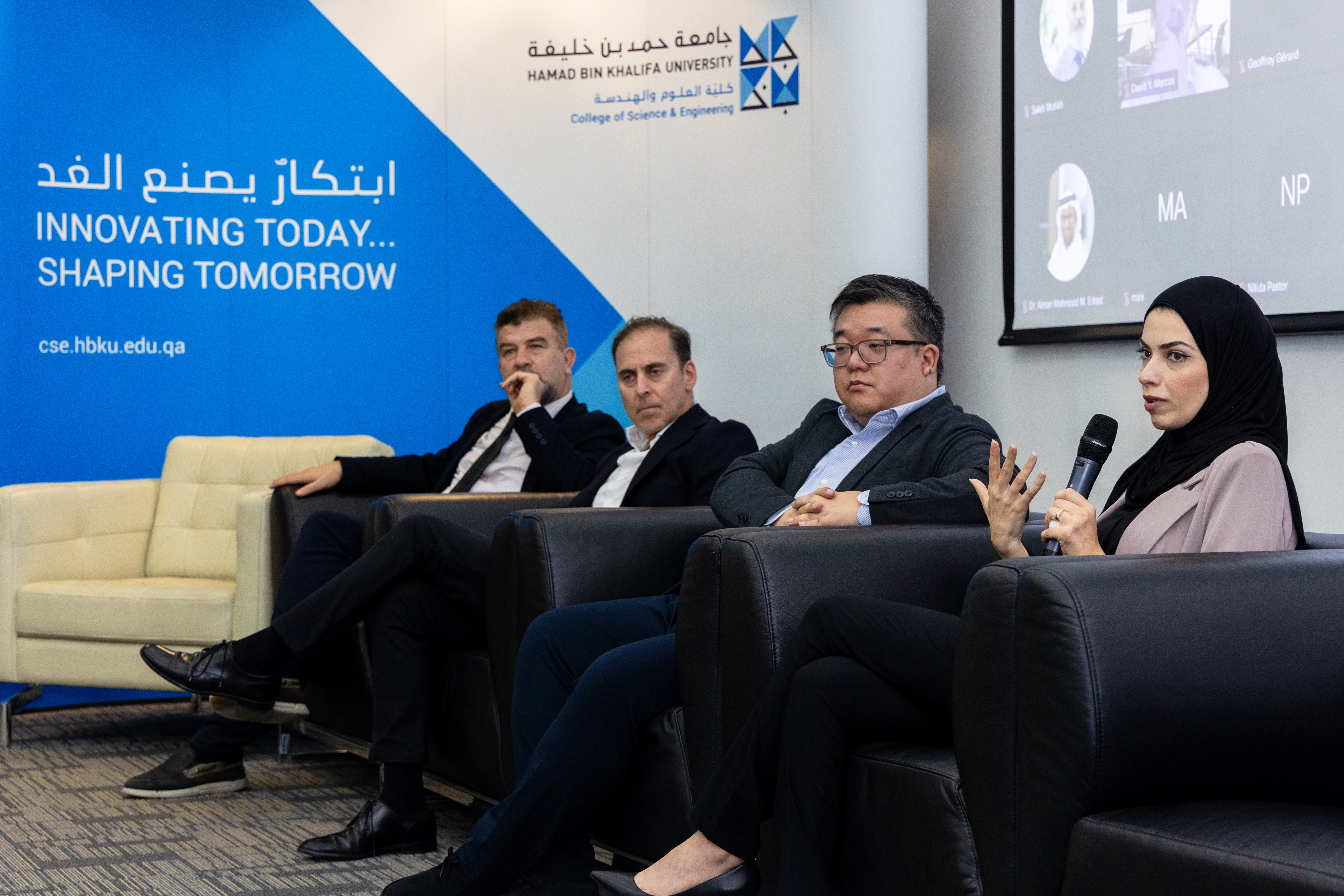
HBKU’s CSE and IE Impact Xcelerator Host Healthcare and Technology Collider Roundtable
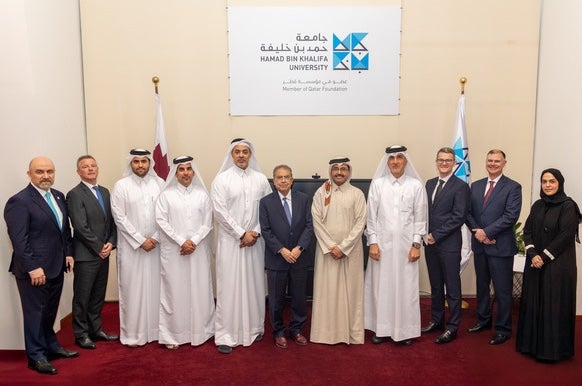
HBKU’s College of Science and Engineering Organizes First Industry and Government Advisory Board Meeting
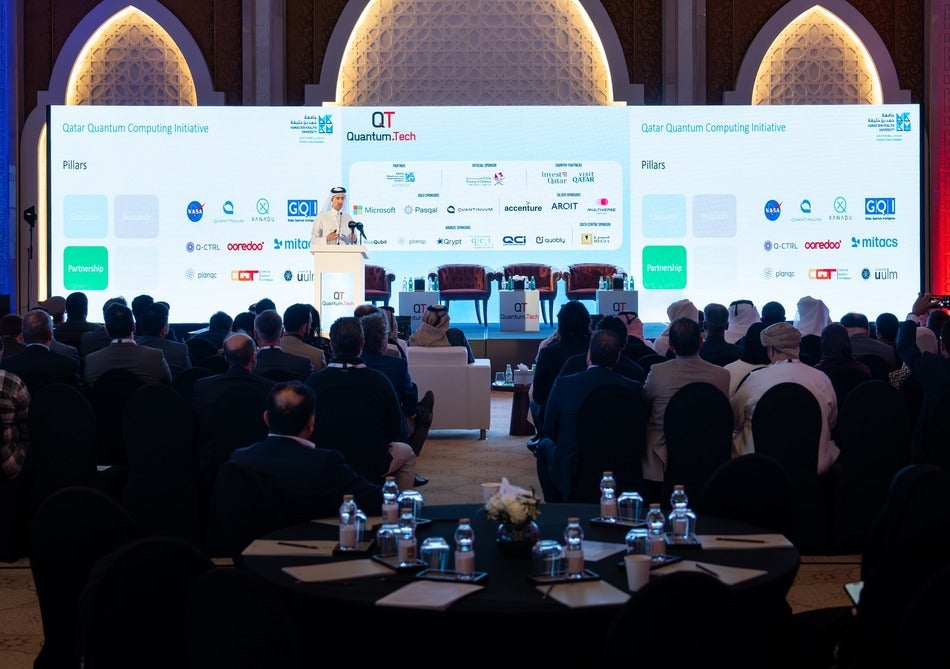
HBKU and Quantum.Tech Bring Major Quantum Event to the Middle East for the First Time
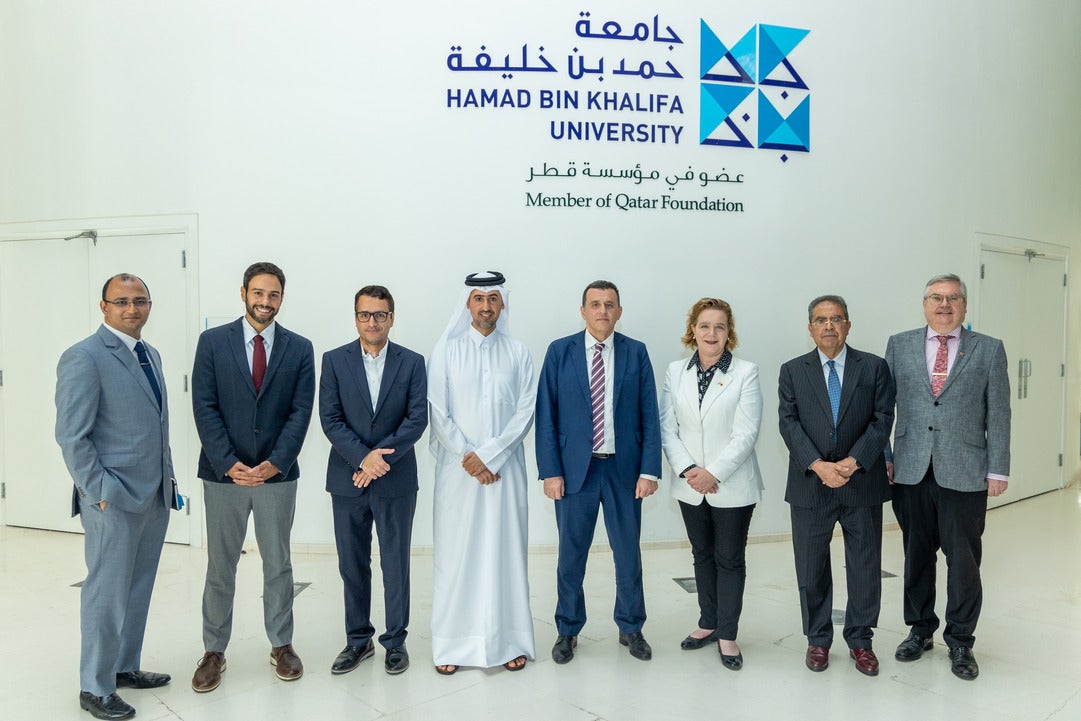
HBKU Signs Memorandum of Understanding with Canada’s Leading Innovation Organization

Hamad Bin Khalifa University and Quantinuum Partner to Advance Quantum Computing in Qatar
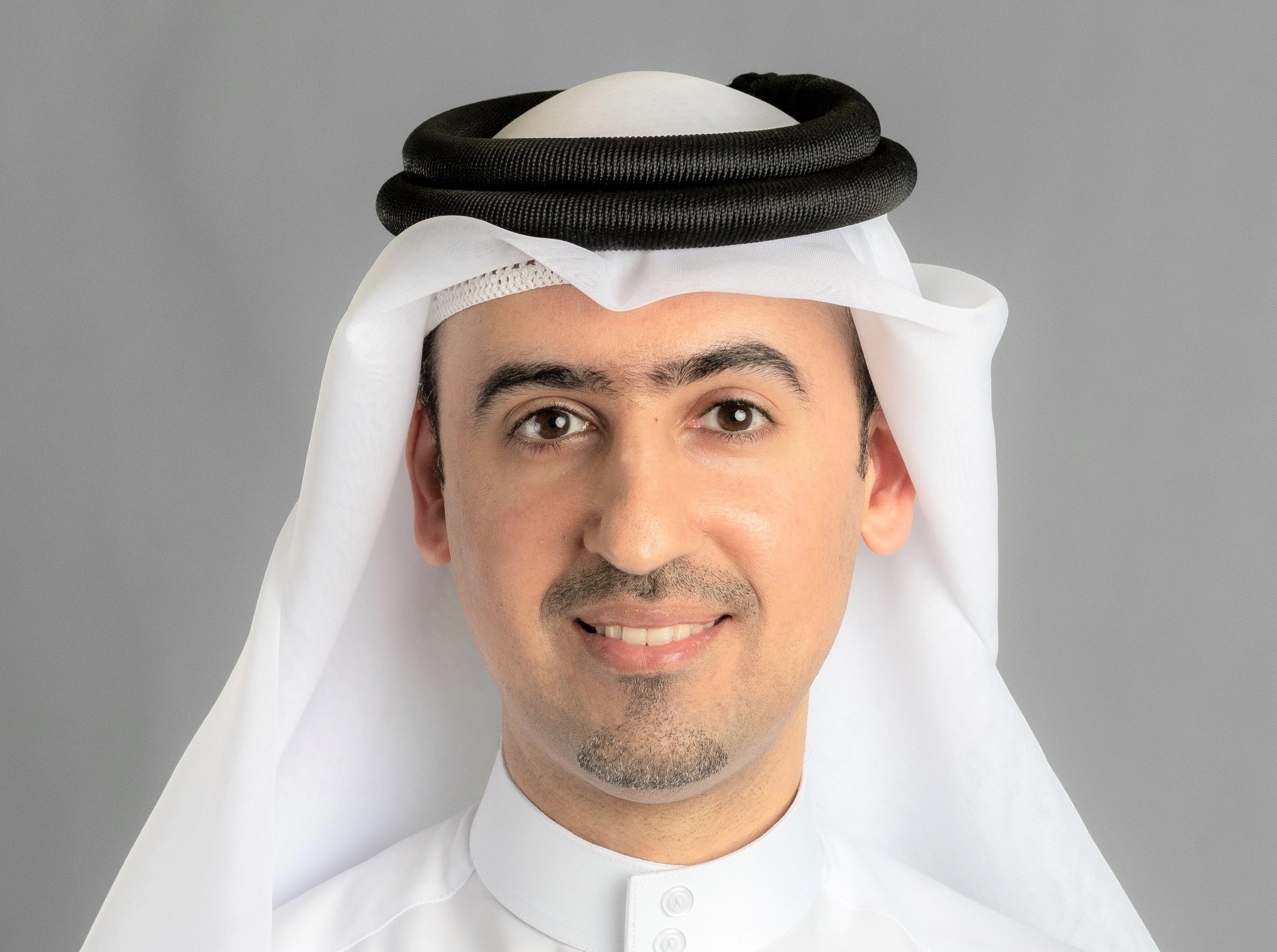
HBKU’s College of Science and Engineering Signs Memorandum of Understanding with NASA on Quantum Research and Education
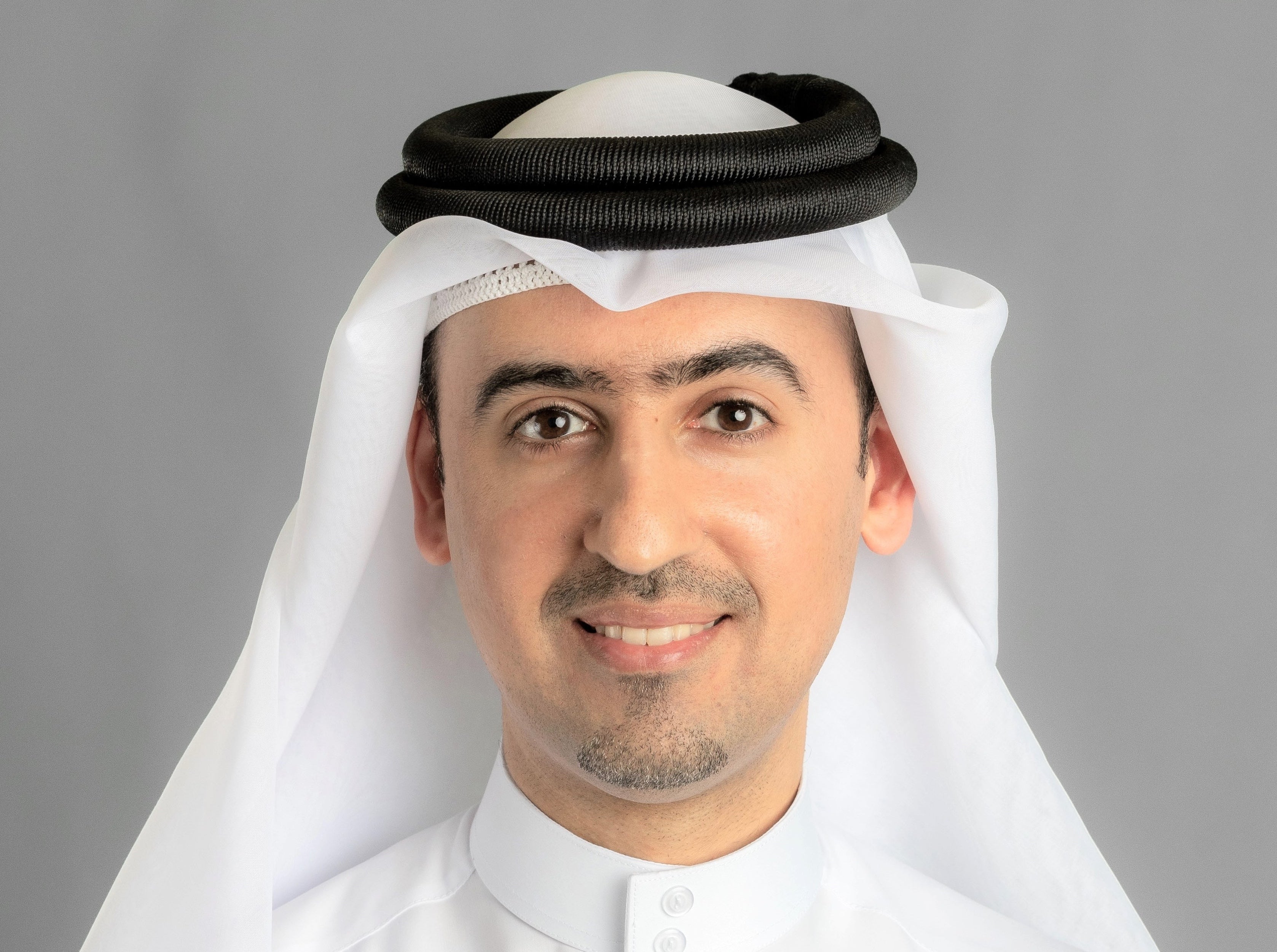
Q-CTRL and Hamad Bin Khalifa University’s College of Science and Engineering Partner to Equip the Next Generation Quantum Workforce in Qatar

QF’s Hamad Bin Khalifa University to Offer Undergraduate Engineering Programs in Education City

HBKU’s CSE and IE Impact Xcelerator Host Healthcare and Technology Collider Roundtable

HBKU’s College of Science and Engineering Organizes First Industry and Government Advisory Board Meeting

HBKU and Quantum.Tech Bring Major Quantum Event to the Middle East for the First Time

HBKU Signs Memorandum of Understanding with Canada’s Leading Innovation Organization

Hamad Bin Khalifa University and Quantinuum Partner to Advance Quantum Computing in Qatar

HBKU’s College of Science and Engineering Signs Memorandum of Understanding with NASA on Quantum Research and Education

Q-CTRL and Hamad Bin Khalifa University’s College of Science and Engineering Partner to Equip the Next Generation Quantum Workforce in Qatar

QF’s Hamad Bin Khalifa University to Offer Undergraduate Engineering Programs in Education City

HBKU’s CSE and IE Impact Xcelerator Host Healthcare and Technology Collider Roundtable

HBKU’s College of Science and Engineering Organizes First Industry and Government Advisory Board Meeting

HBKU and Quantum.Tech Bring Major Quantum Event to the Middle East for the First Time

HBKU Signs Memorandum of Understanding with Canada’s Leading Innovation Organization

Hamad Bin Khalifa University and Quantinuum Partner to Advance Quantum Computing in Qatar

HBKU’s College of Science and Engineering Signs Memorandum of Understanding with NASA on Quantum Research and Education

Q-CTRL and Hamad Bin Khalifa University’s College of Science and Engineering Partner to Equip the Next Generation Quantum Workforce in Qatar

QF’s Hamad Bin Khalifa University to Offer Undergraduate Engineering Programs in Education City

HBKU’s CSE and IE Impact Xcelerator Host Healthcare and Technology Collider Roundtable

HBKU’s College of Science and Engineering Organizes First Industry and Government Advisory Board Meeting

HBKU and Quantum.Tech Bring Major Quantum Event to the Middle East for the First Time

HBKU Signs Memorandum of Understanding with Canada’s Leading Innovation Organization

Hamad Bin Khalifa University and Quantinuum Partner to Advance Quantum Computing in Qatar

HBKU’s College of Science and Engineering Signs Memorandum of Understanding with NASA on Quantum Research and Education

Q-CTRL and Hamad Bin Khalifa University’s College of Science and Engineering Partner to Equip the Next Generation Quantum Workforce in Qatar

QF’s Hamad Bin Khalifa University to Offer Undergraduate Engineering Programs in Education City

HBKU’s CSE and IE Impact Xcelerator Host Healthcare and Technology Collider Roundtable

HBKU’s College of Science and Engineering Organizes First Industry and Government Advisory Board Meeting

HBKU and Quantum.Tech Bring Major Quantum Event to the Middle East for the First Time

HBKU Signs Memorandum of Understanding with Canada’s Leading Innovation Organization

Hamad Bin Khalifa University and Quantinuum Partner to Advance Quantum Computing in Qatar

HBKU’s College of Science and Engineering Signs Memorandum of Understanding with NASA on Quantum Research and Education

Q-CTRL and Hamad Bin Khalifa University’s College of Science and Engineering Partner to Equip the Next Generation Quantum Workforce in Qatar

QF’s Hamad Bin Khalifa University to Offer Undergraduate Engineering Programs in Education City

HBKU’s CSE and IE Impact Xcelerator Host Healthcare and Technology Collider Roundtable

HBKU’s College of Science and Engineering Organizes First Industry and Government Advisory Board Meeting

HBKU and Quantum.Tech Bring Major Quantum Event to the Middle East for the First Time

HBKU Signs Memorandum of Understanding with Canada’s Leading Innovation Organization

Hamad Bin Khalifa University and Quantinuum Partner to Advance Quantum Computing in Qatar

HBKU’s College of Science and Engineering Signs Memorandum of Understanding with NASA on Quantum Research and Education

Q-CTRL and Hamad Bin Khalifa University’s College of Science and Engineering Partner to Equip the Next Generation Quantum Workforce in Qatar

QF’s Hamad Bin Khalifa University to Offer Undergraduate Engineering Programs in Education City

HBKU’s CSE and IE Impact Xcelerator Host Healthcare and Technology Collider Roundtable

HBKU’s College of Science and Engineering Organizes First Industry and Government Advisory Board Meeting

HBKU and Quantum.Tech Bring Major Quantum Event to the Middle East for the First Time

HBKU Signs Memorandum of Understanding with Canada’s Leading Innovation Organization

Hamad Bin Khalifa University and Quantinuum Partner to Advance Quantum Computing in Qatar

HBKU’s College of Science and Engineering Signs Memorandum of Understanding with NASA on Quantum Research and Education

Q-CTRL and Hamad Bin Khalifa University’s College of Science and Engineering Partner to Equip the Next Generation Quantum Workforce in Qatar

QF’s Hamad Bin Khalifa University to Offer Undergraduate Engineering Programs in Education City

HBKU’s CSE and IE Impact Xcelerator Host Healthcare and Technology Collider Roundtable

HBKU’s College of Science and Engineering Organizes First Industry and Government Advisory Board Meeting

HBKU and Quantum.Tech Bring Major Quantum Event to the Middle East for the First Time

HBKU Signs Memorandum of Understanding with Canada’s Leading Innovation Organization

Hamad Bin Khalifa University and Quantinuum Partner to Advance Quantum Computing in Qatar

HBKU’s College of Science and Engineering Signs Memorandum of Understanding with NASA on Quantum Research and Education

Q-CTRL and Hamad Bin Khalifa University’s College of Science and Engineering Partner to Equip the Next Generation Quantum Workforce in Qatar

QF’s Hamad Bin Khalifa University to Offer Undergraduate Engineering Programs in Education City

HBKU’s CSE and IE Impact Xcelerator Host Healthcare and Technology Collider Roundtable

HBKU’s College of Science and Engineering Organizes First Industry and Government Advisory Board Meeting

HBKU and Quantum.Tech Bring Major Quantum Event to the Middle East for the First Time

HBKU Signs Memorandum of Understanding with Canada’s Leading Innovation Organization

Hamad Bin Khalifa University and Quantinuum Partner to Advance Quantum Computing in Qatar

HBKU’s College of Science and Engineering Signs Memorandum of Understanding with NASA on Quantum Research and Education

Q-CTRL and Hamad Bin Khalifa University’s College of Science and Engineering Partner to Equip the Next Generation Quantum Workforce in Qatar

QF’s Hamad Bin Khalifa University to Offer Undergraduate Engineering Programs in Education City

HBKU’s CSE and IE Impact Xcelerator Host Healthcare and Technology Collider Roundtable

HBKU’s College of Science and Engineering Organizes First Industry and Government Advisory Board Meeting

HBKU and Quantum.Tech Bring Major Quantum Event to the Middle East for the First Time

HBKU Signs Memorandum of Understanding with Canada’s Leading Innovation Organization

Hamad Bin Khalifa University and Quantinuum Partner to Advance Quantum Computing in Qatar

HBKU’s College of Science and Engineering Signs Memorandum of Understanding with NASA on Quantum Research and Education

Q-CTRL and Hamad Bin Khalifa University’s College of Science and Engineering Partner to Equip the Next Generation Quantum Workforce in Qatar

QF’s Hamad Bin Khalifa University to Offer Undergraduate Engineering Programs in Education City

HBKU’s CSE and IE Impact Xcelerator Host Healthcare and Technology Collider Roundtable

HBKU’s College of Science and Engineering Organizes First Industry and Government Advisory Board Meeting

HBKU and Quantum.Tech Bring Major Quantum Event to the Middle East for the First Time

HBKU Signs Memorandum of Understanding with Canada’s Leading Innovation Organization

Hamad Bin Khalifa University and Quantinuum Partner to Advance Quantum Computing in Qatar

HBKU’s College of Science and Engineering Signs Memorandum of Understanding with NASA on Quantum Research and Education

Q-CTRL and Hamad Bin Khalifa University’s College of Science and Engineering Partner to Equip the Next Generation Quantum Workforce in Qatar

QF’s Hamad Bin Khalifa University to Offer Undergraduate Engineering Programs in Education City

HBKU’s CSE and IE Impact Xcelerator Host Healthcare and Technology Collider Roundtable

HBKU’s College of Science and Engineering Organizes First Industry and Government Advisory Board Meeting

HBKU and Quantum.Tech Bring Major Quantum Event to the Middle East for the First Time

HBKU Signs Memorandum of Understanding with Canada’s Leading Innovation Organization

Hamad Bin Khalifa University and Quantinuum Partner to Advance Quantum Computing in Qatar

HBKU’s College of Science and Engineering Signs Memorandum of Understanding with NASA on Quantum Research and Education

Q-CTRL and Hamad Bin Khalifa University’s College of Science and Engineering Partner to Equip the Next Generation Quantum Workforce in Qatar

QF’s Hamad Bin Khalifa University to Offer Undergraduate Engineering Programs in Education City

HBKU’s CSE and IE Impact Xcelerator Host Healthcare and Technology Collider Roundtable

HBKU’s College of Science and Engineering Organizes First Industry and Government Advisory Board Meeting

HBKU and Quantum.Tech Bring Major Quantum Event to the Middle East for the First Time

HBKU Signs Memorandum of Understanding with Canada’s Leading Innovation Organization

Hamad Bin Khalifa University and Quantinuum Partner to Advance Quantum Computing in Qatar

HBKU’s College of Science and Engineering Signs Memorandum of Understanding with NASA on Quantum Research and Education

Q-CTRL and Hamad Bin Khalifa University’s College of Science and Engineering Partner to Equip the Next Generation Quantum Workforce in Qatar

QF’s Hamad Bin Khalifa University to Offer Undergraduate Engineering Programs in Education City

HBKU’s CSE and IE Impact Xcelerator Host Healthcare and Technology Collider Roundtable

HBKU’s College of Science and Engineering Organizes First Industry and Government Advisory Board Meeting

HBKU and Quantum.Tech Bring Major Quantum Event to the Middle East for the First Time

HBKU Signs Memorandum of Understanding with Canada’s Leading Innovation Organization

Hamad Bin Khalifa University and Quantinuum Partner to Advance Quantum Computing in Qatar

HBKU’s College of Science and Engineering Signs Memorandum of Understanding with NASA on Quantum Research and Education

Q-CTRL and Hamad Bin Khalifa University’s College of Science and Engineering Partner to Equip the Next Generation Quantum Workforce in Qatar

QF’s Hamad Bin Khalifa University to Offer Undergraduate Engineering Programs in Education City

HBKU’s CSE and IE Impact Xcelerator Host Healthcare and Technology Collider Roundtable

HBKU’s College of Science and Engineering Organizes First Industry and Government Advisory Board Meeting

HBKU and Quantum.Tech Bring Major Quantum Event to the Middle East for the First Time

HBKU Signs Memorandum of Understanding with Canada’s Leading Innovation Organization

Hamad Bin Khalifa University and Quantinuum Partner to Advance Quantum Computing in Qatar

HBKU’s College of Science and Engineering Signs Memorandum of Understanding with NASA on Quantum Research and Education

Q-CTRL and Hamad Bin Khalifa University’s College of Science and Engineering Partner to Equip the Next Generation Quantum Workforce in Qatar

QF’s Hamad Bin Khalifa University to Offer Undergraduate Engineering Programs in Education City

HBKU’s CSE and IE Impact Xcelerator Host Healthcare and Technology Collider Roundtable

HBKU’s College of Science and Engineering Organizes First Industry and Government Advisory Board Meeting

HBKU and Quantum.Tech Bring Major Quantum Event to the Middle East for the First Time

HBKU Signs Memorandum of Understanding with Canada’s Leading Innovation Organization

Hamad Bin Khalifa University and Quantinuum Partner to Advance Quantum Computing in Qatar

HBKU’s College of Science and Engineering Signs Memorandum of Understanding with NASA on Quantum Research and Education

Q-CTRL and Hamad Bin Khalifa University’s College of Science and Engineering Partner to Equip the Next Generation Quantum Workforce in Qatar

QF’s Hamad Bin Khalifa University to Offer Undergraduate Engineering Programs in Education City

HBKU’s CSE and IE Impact Xcelerator Host Healthcare and Technology Collider Roundtable

HBKU’s College of Science and Engineering Organizes First Industry and Government Advisory Board Meeting

HBKU and Quantum.Tech Bring Major Quantum Event to the Middle East for the First Time

HBKU Signs Memorandum of Understanding with Canada’s Leading Innovation Organization

Hamad Bin Khalifa University and Quantinuum Partner to Advance Quantum Computing in Qatar

HBKU’s College of Science and Engineering Signs Memorandum of Understanding with NASA on Quantum Research and Education

Q-CTRL and Hamad Bin Khalifa University’s College of Science and Engineering Partner to Equip the Next Generation Quantum Workforce in Qatar

QF’s Hamad Bin Khalifa University to Offer Undergraduate Engineering Programs in Education City

HBKU’s CSE and IE Impact Xcelerator Host Healthcare and Technology Collider Roundtable

HBKU’s College of Science and Engineering Organizes First Industry and Government Advisory Board Meeting

HBKU and Quantum.Tech Bring Major Quantum Event to the Middle East for the First Time

HBKU Signs Memorandum of Understanding with Canada’s Leading Innovation Organization

Hamad Bin Khalifa University and Quantinuum Partner to Advance Quantum Computing in Qatar

HBKU’s College of Science and Engineering Signs Memorandum of Understanding with NASA on Quantum Research and Education

Q-CTRL and Hamad Bin Khalifa University’s College of Science and Engineering Partner to Equip the Next Generation Quantum Workforce in Qatar

QF’s Hamad Bin Khalifa University to Offer Undergraduate Engineering Programs in Education City

HBKU’s CSE and IE Impact Xcelerator Host Healthcare and Technology Collider Roundtable

HBKU’s College of Science and Engineering Organizes First Industry and Government Advisory Board Meeting

HBKU and Quantum.Tech Bring Major Quantum Event to the Middle East for the First Time

HBKU Signs Memorandum of Understanding with Canada’s Leading Innovation Organization

Hamad Bin Khalifa University and Quantinuum Partner to Advance Quantum Computing in Qatar

HBKU’s College of Science and Engineering Signs Memorandum of Understanding with NASA on Quantum Research and Education

Q-CTRL and Hamad Bin Khalifa University’s College of Science and Engineering Partner to Equip the Next Generation Quantum Workforce in Qatar

QF’s Hamad Bin Khalifa University to Offer Undergraduate Engineering Programs in Education City

HBKU’s CSE and IE Impact Xcelerator Host Healthcare and Technology Collider Roundtable

HBKU’s College of Science and Engineering Organizes First Industry and Government Advisory Board Meeting

HBKU and Quantum.Tech Bring Major Quantum Event to the Middle East for the First Time

HBKU Signs Memorandum of Understanding with Canada’s Leading Innovation Organization

Hamad Bin Khalifa University and Quantinuum Partner to Advance Quantum Computing in Qatar

HBKU’s College of Science and Engineering Signs Memorandum of Understanding with NASA on Quantum Research and Education

Q-CTRL and Hamad Bin Khalifa University’s College of Science and Engineering Partner to Equip the Next Generation Quantum Workforce in Qatar

QF’s Hamad Bin Khalifa University to Offer Undergraduate Engineering Programs in Education City

HBKU’s CSE and IE Impact Xcelerator Host Healthcare and Technology Collider Roundtable

HBKU’s College of Science and Engineering Organizes First Industry and Government Advisory Board Meeting

HBKU and Quantum.Tech Bring Major Quantum Event to the Middle East for the First Time

HBKU Signs Memorandum of Understanding with Canada’s Leading Innovation Organization

Hamad Bin Khalifa University and Quantinuum Partner to Advance Quantum Computing in Qatar

HBKU’s College of Science and Engineering Signs Memorandum of Understanding with NASA on Quantum Research and Education

Q-CTRL and Hamad Bin Khalifa University’s College of Science and Engineering Partner to Equip the Next Generation Quantum Workforce in Qatar

QF’s Hamad Bin Khalifa University to Offer Undergraduate Engineering Programs in Education City

HBKU’s CSE and IE Impact Xcelerator Host Healthcare and Technology Collider Roundtable

HBKU’s College of Science and Engineering Organizes First Industry and Government Advisory Board Meeting

HBKU and Quantum.Tech Bring Major Quantum Event to the Middle East for the First Time

HBKU Signs Memorandum of Understanding with Canada’s Leading Innovation Organization

Hamad Bin Khalifa University and Quantinuum Partner to Advance Quantum Computing in Qatar

HBKU’s College of Science and Engineering Signs Memorandum of Understanding with NASA on Quantum Research and Education

Q-CTRL and Hamad Bin Khalifa University’s College of Science and Engineering Partner to Equip the Next Generation Quantum Workforce in Qatar

QF’s Hamad Bin Khalifa University to Offer Undergraduate Engineering Programs in Education City

HBKU’s CSE and IE Impact Xcelerator Host Healthcare and Technology Collider Roundtable

HBKU’s College of Science and Engineering Organizes First Industry and Government Advisory Board Meeting

HBKU and Quantum.Tech Bring Major Quantum Event to the Middle East for the First Time

HBKU Signs Memorandum of Understanding with Canada’s Leading Innovation Organization

Hamad Bin Khalifa University and Quantinuum Partner to Advance Quantum Computing in Qatar

HBKU’s College of Science and Engineering Signs Memorandum of Understanding with NASA on Quantum Research and Education

Q-CTRL and Hamad Bin Khalifa University’s College of Science and Engineering Partner to Equip the Next Generation Quantum Workforce in Qatar

QF’s Hamad Bin Khalifa University to Offer Undergraduate Engineering Programs in Education City

HBKU’s CSE and IE Impact Xcelerator Host Healthcare and Technology Collider Roundtable

HBKU’s College of Science and Engineering Organizes First Industry and Government Advisory Board Meeting

HBKU and Quantum.Tech Bring Major Quantum Event to the Middle East for the First Time

HBKU Signs Memorandum of Understanding with Canada’s Leading Innovation Organization

Hamad Bin Khalifa University and Quantinuum Partner to Advance Quantum Computing in Qatar

HBKU’s College of Science and Engineering Signs Memorandum of Understanding with NASA on Quantum Research and Education

Q-CTRL and Hamad Bin Khalifa University’s College of Science and Engineering Partner to Equip the Next Generation Quantum Workforce in Qatar

QF’s Hamad Bin Khalifa University to Offer Undergraduate Engineering Programs in Education City

HBKU’s CSE and IE Impact Xcelerator Host Healthcare and Technology Collider Roundtable

HBKU’s College of Science and Engineering Organizes First Industry and Government Advisory Board Meeting

HBKU and Quantum.Tech Bring Major Quantum Event to the Middle East for the First Time

HBKU Signs Memorandum of Understanding with Canada’s Leading Innovation Organization

Hamad Bin Khalifa University and Quantinuum Partner to Advance Quantum Computing in Qatar

HBKU’s College of Science and Engineering Signs Memorandum of Understanding with NASA on Quantum Research and Education

Q-CTRL and Hamad Bin Khalifa University’s College of Science and Engineering Partner to Equip the Next Generation Quantum Workforce in Qatar

QF’s Hamad Bin Khalifa University to Offer Undergraduate Engineering Programs in Education City

HBKU’s CSE and IE Impact Xcelerator Host Healthcare and Technology Collider Roundtable

HBKU’s College of Science and Engineering Organizes First Industry and Government Advisory Board Meeting

HBKU and Quantum.Tech Bring Major Quantum Event to the Middle East for the First Time

HBKU Signs Memorandum of Understanding with Canada’s Leading Innovation Organization

Hamad Bin Khalifa University and Quantinuum Partner to Advance Quantum Computing in Qatar

HBKU’s College of Science and Engineering Signs Memorandum of Understanding with NASA on Quantum Research and Education

Q-CTRL and Hamad Bin Khalifa University’s College of Science and Engineering Partner to Equip the Next Generation Quantum Workforce in Qatar

QF’s Hamad Bin Khalifa University to Offer Undergraduate Engineering Programs in Education City

HBKU’s CSE and IE Impact Xcelerator Host Healthcare and Technology Collider Roundtable

HBKU’s College of Science and Engineering Organizes First Industry and Government Advisory Board Meeting

HBKU and Quantum.Tech Bring Major Quantum Event to the Middle East for the First Time

HBKU Signs Memorandum of Understanding with Canada’s Leading Innovation Organization

Hamad Bin Khalifa University and Quantinuum Partner to Advance Quantum Computing in Qatar

HBKU’s College of Science and Engineering Signs Memorandum of Understanding with NASA on Quantum Research and Education

Q-CTRL and Hamad Bin Khalifa University’s College of Science and Engineering Partner to Equip the Next Generation Quantum Workforce in Qatar

QF’s Hamad Bin Khalifa University to Offer Undergraduate Engineering Programs in Education City

HBKU’s CSE and IE Impact Xcelerator Host Healthcare and Technology Collider Roundtable

HBKU’s College of Science and Engineering Organizes First Industry and Government Advisory Board Meeting

HBKU and Quantum.Tech Bring Major Quantum Event to the Middle East for the First Time

HBKU Signs Memorandum of Understanding with Canada’s Leading Innovation Organization

Hamad Bin Khalifa University and Quantinuum Partner to Advance Quantum Computing in Qatar

HBKU’s College of Science and Engineering Signs Memorandum of Understanding with NASA on Quantum Research and Education

Q-CTRL and Hamad Bin Khalifa University’s College of Science and Engineering Partner to Equip the Next Generation Quantum Workforce in Qatar

QF’s Hamad Bin Khalifa University to Offer Undergraduate Engineering Programs in Education City

HBKU’s CSE and IE Impact Xcelerator Host Healthcare and Technology Collider Roundtable

HBKU’s College of Science and Engineering Organizes First Industry and Government Advisory Board Meeting

HBKU and Quantum.Tech Bring Major Quantum Event to the Middle East for the First Time

HBKU Signs Memorandum of Understanding with Canada’s Leading Innovation Organization

Hamad Bin Khalifa University and Quantinuum Partner to Advance Quantum Computing in Qatar

HBKU’s College of Science and Engineering Signs Memorandum of Understanding with NASA on Quantum Research and Education

Q-CTRL and Hamad Bin Khalifa University’s College of Science and Engineering Partner to Equip the Next Generation Quantum Workforce in Qatar

QF’s Hamad Bin Khalifa University to Offer Undergraduate Engineering Programs in Education City

HBKU’s CSE and IE Impact Xcelerator Host Healthcare and Technology Collider Roundtable

HBKU’s College of Science and Engineering Organizes First Industry and Government Advisory Board Meeting

HBKU and Quantum.Tech Bring Major Quantum Event to the Middle East for the First Time

HBKU Signs Memorandum of Understanding with Canada’s Leading Innovation Organization

Hamad Bin Khalifa University and Quantinuum Partner to Advance Quantum Computing in Qatar

HBKU’s College of Science and Engineering Signs Memorandum of Understanding with NASA on Quantum Research and Education

Q-CTRL and Hamad Bin Khalifa University’s College of Science and Engineering Partner to Equip the Next Generation Quantum Workforce in Qatar

QF’s Hamad Bin Khalifa University to Offer Undergraduate Engineering Programs in Education City

HBKU’s CSE and IE Impact Xcelerator Host Healthcare and Technology Collider Roundtable

HBKU’s College of Science and Engineering Organizes First Industry and Government Advisory Board Meeting

HBKU and Quantum.Tech Bring Major Quantum Event to the Middle East for the First Time

HBKU Signs Memorandum of Understanding with Canada’s Leading Innovation Organization

Hamad Bin Khalifa University and Quantinuum Partner to Advance Quantum Computing in Qatar

HBKU’s College of Science and Engineering Signs Memorandum of Understanding with NASA on Quantum Research and Education

Q-CTRL and Hamad Bin Khalifa University’s College of Science and Engineering Partner to Equip the Next Generation Quantum Workforce in Qatar

QF’s Hamad Bin Khalifa University to Offer Undergraduate Engineering Programs in Education City

HBKU’s CSE and IE Impact Xcelerator Host Healthcare and Technology Collider Roundtable

HBKU’s College of Science and Engineering Organizes First Industry and Government Advisory Board Meeting

HBKU and Quantum.Tech Bring Major Quantum Event to the Middle East for the First Time

HBKU Signs Memorandum of Understanding with Canada’s Leading Innovation Organization

Hamad Bin Khalifa University and Quantinuum Partner to Advance Quantum Computing in Qatar

HBKU’s College of Science and Engineering Signs Memorandum of Understanding with NASA on Quantum Research and Education

Q-CTRL and Hamad Bin Khalifa University’s College of Science and Engineering Partner to Equip the Next Generation Quantum Workforce in Qatar

QF’s Hamad Bin Khalifa University to Offer Undergraduate Engineering Programs in Education City

HBKU’s CSE and IE Impact Xcelerator Host Healthcare and Technology Collider Roundtable

HBKU’s College of Science and Engineering Organizes First Industry and Government Advisory Board Meeting

HBKU and Quantum.Tech Bring Major Quantum Event to the Middle East for the First Time

HBKU Signs Memorandum of Understanding with Canada’s Leading Innovation Organization

Hamad Bin Khalifa University and Quantinuum Partner to Advance Quantum Computing in Qatar

HBKU’s College of Science and Engineering Signs Memorandum of Understanding with NASA on Quantum Research and Education

Q-CTRL and Hamad Bin Khalifa University’s College of Science and Engineering Partner to Equip the Next Generation Quantum Workforce in Qatar

QF’s Hamad Bin Khalifa University to Offer Undergraduate Engineering Programs in Education City

HBKU’s CSE and IE Impact Xcelerator Host Healthcare and Technology Collider Roundtable

HBKU’s College of Science and Engineering Organizes First Industry and Government Advisory Board Meeting

HBKU and Quantum.Tech Bring Major Quantum Event to the Middle East for the First Time

HBKU Signs Memorandum of Understanding with Canada’s Leading Innovation Organization

Hamad Bin Khalifa University and Quantinuum Partner to Advance Quantum Computing in Qatar

HBKU’s College of Science and Engineering Signs Memorandum of Understanding with NASA on Quantum Research and Education

Q-CTRL and Hamad Bin Khalifa University’s College of Science and Engineering Partner to Equip the Next Generation Quantum Workforce in Qatar

QF’s Hamad Bin Khalifa University to Offer Undergraduate Engineering Programs in Education City

HBKU’s CSE and IE Impact Xcelerator Host Healthcare and Technology Collider Roundtable

HBKU’s College of Science and Engineering Organizes First Industry and Government Advisory Board Meeting

HBKU and Quantum.Tech Bring Major Quantum Event to the Middle East for the First Time

HBKU Signs Memorandum of Understanding with Canada’s Leading Innovation Organization

Hamad Bin Khalifa University and Quantinuum Partner to Advance Quantum Computing in Qatar

HBKU’s College of Science and Engineering Signs Memorandum of Understanding with NASA on Quantum Research and Education

Q-CTRL and Hamad Bin Khalifa University’s College of Science and Engineering Partner to Equip the Next Generation Quantum Workforce in Qatar

QF’s Hamad Bin Khalifa University to Offer Undergraduate Engineering Programs in Education City

HBKU’s CSE and IE Impact Xcelerator Host Healthcare and Technology Collider Roundtable

HBKU’s College of Science and Engineering Organizes First Industry and Government Advisory Board Meeting

HBKU and Quantum.Tech Bring Major Quantum Event to the Middle East for the First Time

HBKU Signs Memorandum of Understanding with Canada’s Leading Innovation Organization

Hamad Bin Khalifa University and Quantinuum Partner to Advance Quantum Computing in Qatar

HBKU’s College of Science and Engineering Signs Memorandum of Understanding with NASA on Quantum Research and Education

Q-CTRL and Hamad Bin Khalifa University’s College of Science and Engineering Partner to Equip the Next Generation Quantum Workforce in Qatar

QF’s Hamad Bin Khalifa University to Offer Undergraduate Engineering Programs in Education City

HBKU’s CSE and IE Impact Xcelerator Host Healthcare and Technology Collider Roundtable

HBKU’s College of Science and Engineering Organizes First Industry and Government Advisory Board Meeting

HBKU and Quantum.Tech Bring Major Quantum Event to the Middle East for the First Time

HBKU Signs Memorandum of Understanding with Canada’s Leading Innovation Organization

Hamad Bin Khalifa University and Quantinuum Partner to Advance Quantum Computing in Qatar

HBKU’s College of Science and Engineering Signs Memorandum of Understanding with NASA on Quantum Research and Education

Q-CTRL and Hamad Bin Khalifa University’s College of Science and Engineering Partner to Equip the Next Generation Quantum Workforce in Qatar

QF’s Hamad Bin Khalifa University to Offer Undergraduate Engineering Programs in Education City

HBKU’s CSE and IE Impact Xcelerator Host Healthcare and Technology Collider Roundtable

HBKU’s College of Science and Engineering Organizes First Industry and Government Advisory Board Meeting

HBKU and Quantum.Tech Bring Major Quantum Event to the Middle East for the First Time

HBKU Signs Memorandum of Understanding with Canada’s Leading Innovation Organization

Hamad Bin Khalifa University and Quantinuum Partner to Advance Quantum Computing in Qatar

HBKU’s College of Science and Engineering Signs Memorandum of Understanding with NASA on Quantum Research and Education

Q-CTRL and Hamad Bin Khalifa University’s College of Science and Engineering Partner to Equip the Next Generation Quantum Workforce in Qatar

QF’s Hamad Bin Khalifa University to Offer Undergraduate Engineering Programs in Education City

HBKU’s CSE and IE Impact Xcelerator Host Healthcare and Technology Collider Roundtable

HBKU’s College of Science and Engineering Organizes First Industry and Government Advisory Board Meeting

HBKU and Quantum.Tech Bring Major Quantum Event to the Middle East for the First Time

HBKU Signs Memorandum of Understanding with Canada’s Leading Innovation Organization

Hamad Bin Khalifa University and Quantinuum Partner to Advance Quantum Computing in Qatar

HBKU’s College of Science and Engineering Signs Memorandum of Understanding with NASA on Quantum Research and Education

Q-CTRL and Hamad Bin Khalifa University’s College of Science and Engineering Partner to Equip the Next Generation Quantum Workforce in Qatar

QF’s Hamad Bin Khalifa University to Offer Undergraduate Engineering Programs in Education City

HBKU’s CSE and IE Impact Xcelerator Host Healthcare and Technology Collider Roundtable

HBKU’s College of Science and Engineering Organizes First Industry and Government Advisory Board Meeting

HBKU and Quantum.Tech Bring Major Quantum Event to the Middle East for the First Time

HBKU Signs Memorandum of Understanding with Canada’s Leading Innovation Organization

Hamad Bin Khalifa University and Quantinuum Partner to Advance Quantum Computing in Qatar

HBKU’s College of Science and Engineering Signs Memorandum of Understanding with NASA on Quantum Research and Education

Q-CTRL and Hamad Bin Khalifa University’s College of Science and Engineering Partner to Equip the Next Generation Quantum Workforce in Qatar

QF’s Hamad Bin Khalifa University to Offer Undergraduate Engineering Programs in Education City






